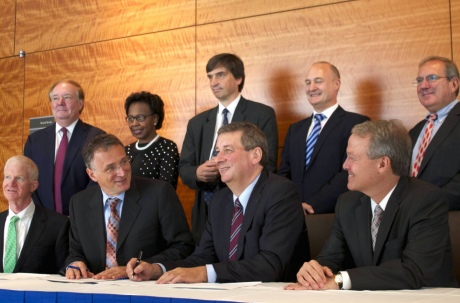Imperial and Houston Methodist explore medical collaborations

One of the United States' most prestigious medical centres is to explore joint education and research opportunities with Imperial College London.
Houston Methodist and Imperial are to explore joint programmes to develop new medical technologies, as well as educational opportunities for Imperial medical students, postgraduates and postdoctoral fellows to study in Houston.
There is great synergy between our biomedical, science and engineering strengths
– Professor Dermot Kelleher
Vice President (Health)
The news comes six months after the Mayor of London Boris Johnson visited Imperial to launch MedCity: an initiative to position London and the greater south east as a world-leading region for life science research, development, manufacturing and commercialisation.
Imperial’s Professor David Gann, Vice President (Development & Innovation), and Professor Dermot Kelleher, Vice President (Health), signed the Memorandum of Understanding with Houston Methodist Research Institute President and CEO Dr Mauro Ferrari, after a tour of Houston Methodist’s clinical and scientific facilities. Imperial’s Provost Professor James Stirling also signed the MoU.

Professors David Gann, Dermot Kelleher and colleagues from Imperial and Houston Methodist
Professor David Gann, Vice President (Development and Innovation), at Imperial said: "Houston Methodist Research Institute and Imperial College London both share in their missions a commitment to work across disciplines and to translate their discoveries and innovations into health and wealth improvements.
"Collaboration is the name of the game and we look forward to discussing how we can create new models for enterprise and achievement between both institutions, in Houston and in London."
Translational opportunities
We see vast potential for collaboration and the rapid development of spectacular new therapeutics and medical technologies
– Dr Mauro Ferrari
President, Houston Methodist Research Institute
Professor Dermot Kelleher, Vice President (Health) and Dean of the Faculty of Medicine, said: "Houston Methodist Research Institute has outstanding strengths in the clinical and translational medical areas and Imperial College London is excited to be exploring the development of new collaborative research and education programmes.
“There is great synergy between our biomedical, science and engineering strengths that potentially unlocks new clinical and scientific student exchange programmes, new clinical trials capabilities and new approaches to therapeutic and medical device development.”
Dr Mauro Ferrari, President of Houston Methodist Research Institute, said: "We are excited about developing unique educational and research opportunities with an institution as widely respected as Imperial College London. We see vast potential for collaboration and the rapid development of spectacular new therapeutics and medical technologies. Our partnership can reduce the time it takes for promising new medical technologies to get to patients, and provide a wealth of educational and training opportunities to Imperial College London students and fellows who seek experience in Houston Methodist laboratories and clinics.”
Dr Ferrari said the joint programs could also broaden Imperial College London students' educational experiences by providing them with opportunities to hone their skills in Houston Methodist's areas of clinical and research strength.
The partnership is also expected to provide Imperial students with the chance to conduct research in Houston Methodist's areas of excellence, including nanomedicine, cancer immunotherapy, stem cell-aided cardiovascular regenerative medicine, and biomedical microfluidics.
Tong Sun, Director of Operations at the Houston Methodist Research Institute, said: "The development of medical technologies has changed in many fundamental ways. Increasingly, the commercialization of new technologies in medicine requires a global perspective, not a regional or national perspective. Most new technologies aren't only relevant to the US or England or Europe, but may dramatically change lives all over the world. Imperial College London could one day be our strategic partner in overseeing clinical trials of a Houston Methodist technology in Europe, as we could be their partner in the US or North America for technology they develop. We hope to learn a lot from this mutually beneficial partnership."
Article text (excluding photos or graphics) © Imperial College London.
Photos and graphics subject to third party copyright used with permission or © Imperial College London.
Reporter
Andrew Scheuber
Communications Division